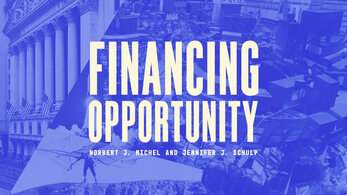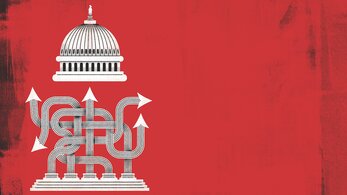Cato Quarterly
Events
Surveillance Week 2024
This year saw many advancements in artificial intelligence and other technologies, altering what’s possible for law enforcement. During one of four Surveillance Week events, Patrick G. Eddington (top left), senior fellow at the Cato Institute, hosted journalist Radley Balko (top right); Albert Fox Cahn (bottom left), founder and executive director of the Surveillance Technology Oversight Project; and Jay Stanley (bottom right), senior policy analyst with the American Civil Liberties Union’s Speech, Privacy, and Technology Project, to review the year in local law enforcement.
23rd Annual Constitution Day Conference
Hon. Neomi Rao (pictured), serving the US Court of Appeals for the DC Circuit, delivered the annual B. Kenneth Simon lecture at this year’s Constitution Day conference. In it, she critiqued legal schools of thought that emphasize preferred policy outcomes and other flawed approaches to legal interpretation. Cato hosted noted scholars of diverse perspectives to discuss the recently concluded Supreme Court term and the important cases coming up for separation of powers, technology, speech, and more.
Financial Privacy Under Fire
As financial services have become increasingly digitized, the volume of financial records to which the government has easy—and often unfettered—access has grown exponentially. Halfway through the full day of expert panels, Jennifer Schulp (right), director of financial regulation studies at the Center for Monetary and Financial Alternatives, moderated a discussion with Rep. Patrick McHenry (R‑NC, left). McHenry, chair of the House Financial Services Committee, commented that Cato, unlike many organizations in Washington, DC, is an “equal opportunity offender” when it comes to calling out bad policy on both the left and the right.
Biden Rule Will Strip Many Sick Patients of Health Insurance
Congress exempts short-term, limited-duration insurance (STLDI) from nearly all federal regulation. In September, the government imposed rules limiting STLDI policies to no more than three months. Michael F. Cannon (left), Cato’s director of health policy studies, argues that the rules eliminate consumer protections and will strip health insurance from the sick, leaving them uninsured for up to 12 months. He spoke with Natasha Murphy (middle), director of health policy at the Center for American Progress, and Sal Nuzzo (right), executive director of Consumers Defense.
Politics Without Ethics and Democracy in Crisis
Politics is a brutal game, but Robert F. Bauer (right), professor at the New York University School of Law, asks: Where does the line fall between the hardball of politics and attacks on the very foundation of democracy? Bauer outlined the arguments in his book The Unraveling: Reflections on Politics Without Ethics and Democracy in Crisis with John Samples (left), vice president and director of Cato’s Center for Representative Government. Bauer was White House counsel to President Barack Obama.
Publications
Financing Opportunity
Many would be shocked to learn how many financial market distortions are caused by government policies. Authors Norbert Michel, vice president and director of the Center for Monetary and Financial Alternatives (CMFA), and Jennifer J. Schulp, director of financial regulation studies at the CMFA, provide a thorough yet easily accessible explanation of US financial markets. Their new book, Financing Opportunity, proposes ways to improve how they function.
“Perennial false narratives … hold that our financial markets are underregulated casinos and that they drain capital from the productive sectors of our economy. Norbert Michel and Jennifer Schulp effectively refute both notions. They show that … the depth and sophistication of our public and private financial markets help drive American growth.”
—Pat Toomey, former ranking member of the Senate Committee on Banking, Housing, and Urban Affairs
Cato Handbook on Executive Orders and Presidential Directives
Executive orders and other presidential directives that conflict with the principles of individual liberty, free markets, limited government, peace, and the US Constitution can and should be revoked or amended by the next president—with the stroke of a pen, as they were enacted. This handbook, edited by Alex Nowrasteh, vice president for economic and social policy studies, provides a list and explanation of the executive orders that should be first to go. Eight policy areas are covered, including the administrative state, health care, technology, and more. Notably, the handbook analyzes reforms that would properly confine the president’s power, including legislation that could reclaim congressional powers and courts revisiting the nondelegation doctrine. Otherwise, the back-and-forth of polarizing executive orders will drive our country further apart.
Illustrated Supreme Court Review
To complement the latest Cato Supreme Court Review (for 2023–2024), Cato’s legal scholars collaborated with a talented artist to create the first-ever edition of the Illustrated Supreme Court Review. Legal concepts come to life as terms like the “Chevron two-step” transform into literal dances between the executive and judicial branches. This volume, akin to a graphic novel, is a perfect introduction to the Supreme Court term for nonlawyers and lawyers alike, both young and old. This volume will be distributed to new Cato audiences, such as high school courses and civic education programs.
Defending Globalization
The original essays from both Cato Institute scholars and outside contributors compiled in this volume offer a range of perspectives on globalization—what it has produced, what its alternatives are, and what people think about it—and offer a proactive case for more global integration.
“Defending Globalization is one of the most comprehensive, insightful, and easily accessible accounts of globalization that I have seen in some time.”
—Dr. Ngozi Okonjo-Iweala, director-general, World Trade Organization
Recent Cato Studies
A Bigger Government Means Giving Up Almost Half Your Paycheck
Absent significant spending reforms, Americans may face a future resembling the European tax system, requiring an almost 50 percent tax increase on middle-class Americans. This report by Adam N. Michel, director of tax policy studies, describes the tax systems used to finance European levels of spending, the middle-class tax burden in the United States, and the negative impact of high taxes on incentives to work.
Fiscal Policy Report Card 2024
The Wall Street Journal, Politico, and other publications reported on the results of the Fiscal Policy Report Card on America’s Governors 2024. Tim Walz (D‑MN) came in last for his state budget actions since 2022, while Kim Reynolds (R‑IA) earned the top score for restraining state taxes and spending during that time. Across the nation, state government budgets grew from federal aid during the COVID-19 pandemic. With that funding waning, governors who scored well stabilized spending and cut individual or income tax rates. Chris Edwards, Kilts Family Chair in Fiscal Studies at Cato and author of the biennial report, also examined states’ rainy day funds, debt levels, business subsidies, and more.














